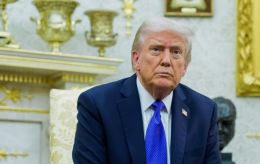Sweden should become NATO member soon, Russia remains threat - Defense Minister
 Pal Jщnson, Minister of Defense of Sweden (Getty Images)
Pal Jщnson, Minister of Defense of Sweden (Getty Images)
Sweden must urgently join NATO to ward off the threat from the Russian Federation, according to Sweden's Minister of Defense, Pal Jonson, in an exclusive feature by The Guardian.
"We do not want to write off Russia as a threat because Russia has shown evidence of endurance [in Ukraine]," explained the Minister of Defense. "So we have to stick to it and we do that in the best way by strengthening our national weaknesses and becoming fully integrated into Nato as soon as possible."
According to Jonson, Sweden has received strong support from NATO allies. Stockholm is offering the North Atlantic Alliance "better strategic depth" and "important military resources." Despite delays from Türkiye and Hungary, Sweden's Minister of Defense remains confident about his country's future in NATO.
"We are safer now than we were before we sought Nato membership through security assurances we have received from the US, the UK, Germany, France and the other Nordic countries," added Jonson.
He reported recent discussions with Finnish colleagues regarding the recent tensions on the Russia-Finland border, where Finnish authorities have accused Moscow of helping to facilitate the passage of increasing numbers of asylum seekers.
According to Jonson, Finland remains Sweden's closest political partner in the realm of security and defense. The relationship between the two countries will continue to be central for Stockholm.
Sweden's NATO accession
Sweden's accession to NATO is expected in about a year and a half. Previously, Stockholm planned to join the Alliance together with Finland. Both countries reconsidered their policy of non-alignment after Russia's full-scale invasion of Ukraine. Finland joined NATO in June.
Sweden's application was ratified by all NATO countries except Türkiye and Hungary.
Recently, President Recep Tayyip Erdogan submitted the application for consideration to the country's parliament. However, on November 16, the Committee on Foreign Affairs of the Turkish Parliament postponed discussions on the bill for approving the ratification of the protocol.

